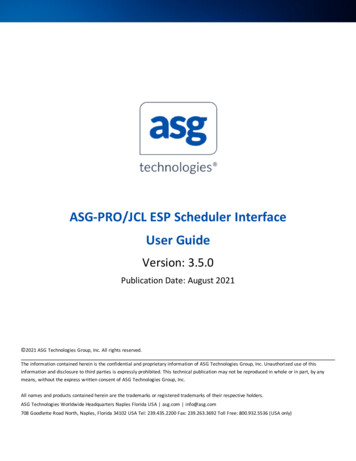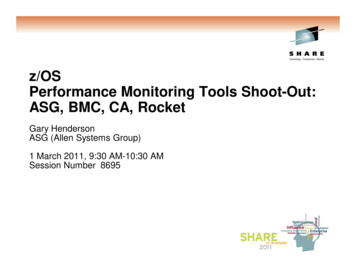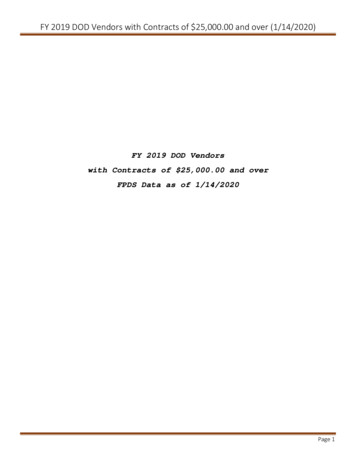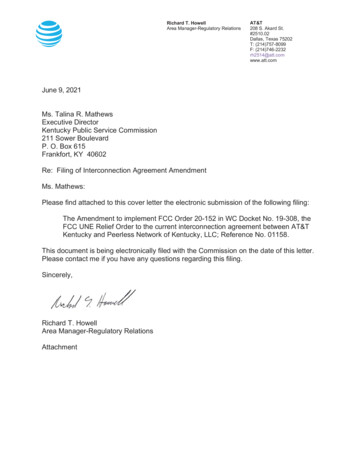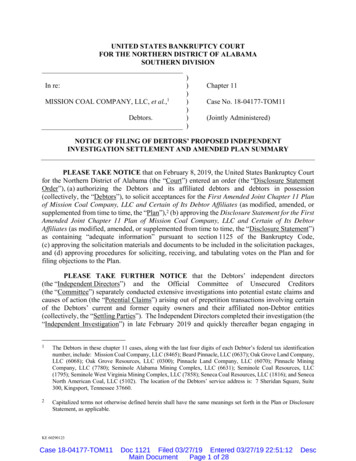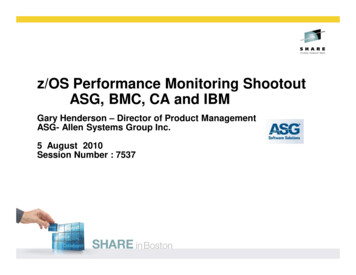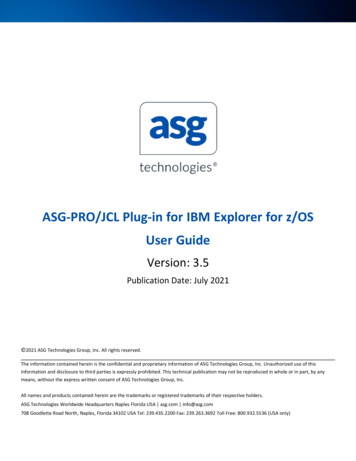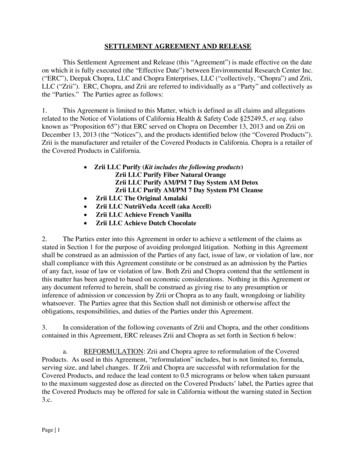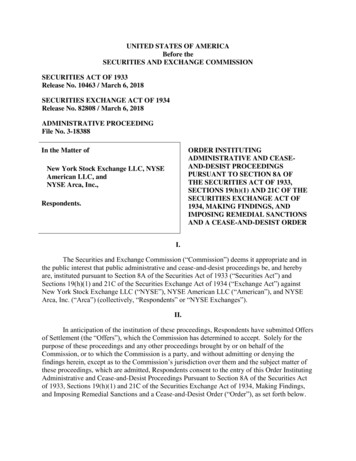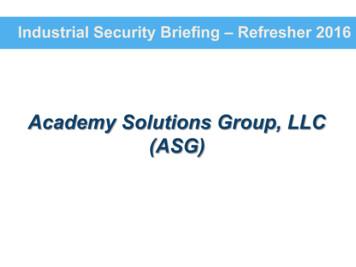
Transcription
Industrial Security Briefing – Refresher 2016Academy Solutions Group, LLC(ASG)
GlossaryCAPCO – Controlled Access Program Coordination OfficeCDC – Cleared Defense ContractorCOR – Contracting Officer RepresentativeCSSO – Contractor Special Security OfficerDoD – Department of DefenseDSS – Defense Security ServiceFSO – Facility Security OfficerIS – Information SystemITR – International Travel RequestNISPOM – National Industrial Security Program Operating ManualPM – Program (or Project) ManagerSCI – Sensitive Compartmented InformationVR – Visit Request
Security Briefing AgendaPer NISPOM, 3-106. Initial Security Briefings. Prior to Being GrantedAccess to Classified Information, an Employee Shall Receive an InitialSecurity Briefing with periodic refresher briefings during each year thatIncludes the Following:A.A Threat Awareness Briefing/Insider Threat BriefingB.A Defensive Security BriefingC.An Overview of the Security Classification SystemD.Employee Reporting Obligations and RequirementsE.Security Procedures and Duties Applicable to the Employee's JobAdditionally, we will cover the Special Security Agreement requirements.
Threat Awareness
Counterintelligence ThreatnUnited States defense-relatedtechnologies and information are underattack: each day, every hour, and frommultiple sources.nThe attack is pervasive, relentless, andunfortunately, at times successful.nAs a result, the United States’ technicallead, competitive edge, and strategicmilitary advantage are at risk, and ournational security interests could becompromised.nDefeating this attack requires knowledgeof the threat and diligence on the part ofall personnel charged with protectingclassified and controlled information, todeter or neutralize its effect.
Targeted Technologiesn DSS analysis of FY09 Suspicious Contact Reports indicated thefollowing technologies, listed in descending order of foreign entityinterest, represented probable collection priorities:– Information Systems– Aeronautics– Lasers and Optics– Sensors– Marine Systems– Positioning, Navigation, and Time– Electronics– Non-DSTL* Technology– Armaments and Energetic Materials– Materials and Processing* DoD’s Developing Science & Technologies List
Insider ThreatDSS defines insider threat as:Acts of commission or omission by an insider who intentionally or unintentionallycompromises or potentially compromises DoD's ability to accomplish its mission. These actsinclude, but are not limited to, espionage, unauthorized disclosure of information, and anyother activity resulting in the loss or degradation of departmental resources or capabilities.Potential Espionage Indicators:nnnnFailure to report overseas travel or contact with foreign nationalsEngaging in classified conversation without a need to knowExploitable behavior traitsRepeated security violations
Defensive Security Awareness
Counterintelligence TrendsCollector Affiliations - FY 2009Percentagesn Targeting U.S. Technologiesn The collector affiliationssuspicious entities mostfrequently used arerepresented in this figure– Commercial entitiesrepresented the topcollectors of United Statestechnology, outstrippinggovernment affiliatedentities as the mostfrequently observedcollector category
Top Four Collection Methods Used (FY09)n Direct Requests– Email requests for information, web-card purchase requests, price quoterequests, phone calls, or marketing surveysn Suspicious Internet Activity– Confirmed intrusion, attempted intrusion, computer network attack, potentialpre-attack, or spamn Solicitation and Seeking Employment– Offering technical and business services to Cleared Defense Contractors(CDCs), resume submissions, or sales offersn Foreign Visits and Targeting– Suspicious activity at a convention, unannounced visit to a CDC,solicitations to attend a convention, offers of paid travel to a seminar,targeting of travelers, questions beyond scope, or overt search and seizure
Foreign Travel Vulnerabilityn Foreign Travel Increases the Risk of Foreign Intelligence Targeting– Collection Techniques Include: Bugged hotel rooms or airline cabins Intrusions or searches of hotel rooms, briefcases, luggage, etc. Intercepts of fax and email transmissions Recording of telephone calls/conversations Unauthorized access and downloading, including outright theft of hardware andsoftware Installation of malicious software Recruitment of substitution of flight attendants
Computer Securityn CDCs Provide Critical Research and Support to Programs Giving theU.S. an Economic, Technological, and Military Advantage in an EverIncreasing Global Economyn Travelers Should Report Theft, Unauthorized or Attempted Access,Damage, and Evidence of Surreptitious Entry of their PortableElectronics– These effective counter-measures can decrease or prevent the loss ofsensitive information: Leave unnecessary electronic devices at homeUse designated ‘travel laptops’Perform a comprehensive anti-virus scan on all electronic devices prior todeparture and upon returnEnsure encryption is installed and running properlyEnsure no sensitive or controlled data exists on your desktop or hard drive
Security Classification Awareness
Protected InformationnTop Secret - Information or material, in which the unauthorized disclosure would cause“EXCEPTIONALLY GRAVE” damage to National Security.nSecret - Information or material, that the unauthorized disclosure of which would cause“SERIOUS” damage to National Security.nConfidential - Information or material, that the unauthorized disclosure of which wouldcause “DAMAGE” to National Security.nSCI – Sensitive Compartmented Information– Protection of Sources and MethodsnSAP – Special Access Program– Any approved program that imposes need-to-know or access controlsbeyond those normally required for access to CONFIDENTIAL, SECRET,or TOP SECRETnCOMSEC – Communications Security– Secure communications utilizing NSA cryptographic material
Classified Informationn Must never be left unattendedn Must never be discussed in public placesn Must be discussed only on securetelephones or sent via secure faxesn Must be under the constant control of anauthorized personn Must be stored in an approved locationn Must only be processed on an approvedsystemn Must not be removed or transferredwithout prior approval from the FSO/CSSO
Disclosure & Need to Known REMEMBER: Clearance Need to Know Access to Classified Informationn Need-to-Know is determined by the originator of the classified informationn Some customers may require Contracting Officer Representative (COR)approval before releasing classifiedn If in doubt, contact your PM, FSO, or CSSOn Gathering or Transmitting National Defense Information to, or on Behalf of, aForeign Government is Punishable by Imprisonment or Deathn Failure to Report Such Occurrences, Allowing them to Occur through GrossNegligence, or Conspiracy to Defraud the U.S. is Punishable by Fines up to 10,000 or Prison Terms up to 10 years
Marking Classifiedn Executive Order 13526, as amended, contains broad guidance on classificationmarkingn Controlled Access Program Coordination Office (CAPCO) maintains theregister of approved Intelligence Community classification markingsn DoD 5200.1-R directs the application of approved markings to various types ofdocuments/productsn DoD 5105.21-M-1 provides SCI marking guidancen Required Markings– Overall Classification (most restrictive)– Portion Marking (e.g., titles, paragraphs, attachments)– Classification authority and declassification instructions (“Derived from:/Declassify on”block)– Mark each portion / paragraph / sub paragraph, etc., according to its content whenstanding alonen Contact your FSO or CSSO with any questions
Disclosure of Contract-related Informationn Release of Information– Determined by DD254s for each contract– No Public Release is authorized without written approval IAW the DD254n Public Disclosure– Neither confirm nor deny the validity of classified, sensitive, or customerinformation – even when it may appear in open-source publications, TV,media, or internet outlets– You must obtain advance approval from the customer and ASG Securityprior to publishing or making public any information stated above (be sureto obtain your PM and VP approval prior to contacting the customer forpublic release authorization)– Open publication DOES NOT declassify the information Inherently Government responsibility
Transfer of Classified Materialsn TRANSFER METHODS APPROVED– Electronic Classified e-mail must only be sent utilizing accredited systemsClassified faxes must be logged in accordance with local policies/procedures– Hand Carry Requires advanced approval of your FSO or CSSORequires signed transmittal documentsRequires courier card and employee badge on your person at all times– Certified Defense Courier Service Requires appropriate accounts and addressing– U.S. Mail Confidential and Secret only (FedEx may be used with prior approval)Always check with Customer Security prior to transferring or transporting classifiedmaterials to ensure all proper procedures, documentation, and wrapping/markingregulations are met.19
Security Violations/Infractionsn Protecting our nation’s classifieddata and information is criticaln Possible consequences of Minorviolations:– Verbal Counseling– Written Counseling– Suspension/Terminationn Possible consequences of Majorviolations:––––Same as minor violationsLoss of your security clearanceArrestImprisonment or fines
Physical Securityn At least 5 days in advance of visiting other companies/facilities,ensure that you request that a Visit Request (VR) be sent– Depending on the contract you are on, the VR might be sent by yourprime’s CSSO, or possibly by your COR or government PMn Badges– Should be worn at or above the waist, picture-side out– Only display the badge required/provided for the building you are visitingn Ensure all local customer security policies and procedures arefollowed/met– Ensure you are aware of company or customer security practices andprocedures and that they are followed consistently– Be aware you are subject to search when entering/leaving clearedfacilities21
Computer Securityn Notify your FSO immediately if classified information is found on anunclassified system at your work location or ASG Security if classifiedinformation is found on any other unclassified system– DISCONNECT YOUR COMPUTER FROM THE LAN– DO NOT attempt to clean it yourself – wait for IS personnel to respond– DO NOT Delete, Forward, Print, or Save the informationn Phishing– Do you see anything wrong with the addresses below? -bilLing.comNotice@bankofamer1ca.comn Be aware of your actions and communicationsn Do not open attachments or follow hyperlinks unless you are expectingthem from a confirmed/trusted sender
Employee Reporting Obligations
Reporting Requirementsn ANY CHANGE in status (since last investigation) MUST be reported:– Security violations/infractions– Change in marital status– Adult cohabitation– Psychological counseling(other than marital, career, or grief)– Financial problems, garnishments,bankruptcy, late payments (excessiveindebtedness), or sudden affluence– Close or continuing foreign contacts– Litigations, charges, arrests, courtsummons – ANY involvementwith police– Application or possession of aforeign passport
Adverse InformationnAny information that reflects on the integrity or character of a cleared employee that indicatestheir capability of safeguarding classified material. Samples are below; if you have doubtcontact Security.nAny convictions of wrongdoings– other than a simple traffic stop/ticketnAny arrests resulting in a summons––––nDriving while intoxicatedDriving under the influenceAll illegal drug chargesDomestic ViolenceAny financial difficulties– Bad Check Conviction– Late payment of 60-90 days or greater– BankruptcynHospitalization for Mental or Emotional ProblemsnMembership in Subversive OrganizationsnSecurity Violations or Compromises
Suspicious Contact Reportingn Suspicious contacts include:– Unsolicited requests for detailed information about Your Job Security Clearance Contract, Sensitive, or Proprietary Information Technologyn Information requests that seem out of place, unusual, very pointed/specific, or out of the ordinary should be reported immediately– Report to ASG Security immediately Potential to be routed to Government Do not discuss classified or controlled information with family members oranyone else without a confirmed need-to-know established
National Reportingn Where to report Fraud, Waste, Abuse, Unauthorized Disclosures(leaks), Human Trafficking, and Threats to Homeland & NationalSecurity– DoD: 800-424-9098 or e-mail to hotline@dodig.osd.mil or their website athttp://www.dodig.osd.mil/hotline Posted in break rooms and common areas throughout cleared facilitiesn You should also contact your FSO or CSSOn Report to your FSO or CSSO the receipt of classified material fromforeign interests not received through government channelsn Report immediately to your FSO or CSSO any information coming toyour attention concerning actual, probable, or possible espionage,sabotage, terrorism, or subversive activities at any of its locations –Security has an obligation to forward a written report to the FBI
Security Procedures and Duties
Secured Areasn Inadvertent Disclosure– Involuntary unauthorized access to classified information to an individualwithout a clearance/access Notify your FSO/CSSO immediately– Personal Responsibilities Notify Security immediately§§Contain/control the situation/material immediatelyAssist in the investigation as directed by your FSO/CSSOn During Emergencies– Always grant unimpeded access to emergency personnel (police, fire,medical) Ensure and confirm your FSO/CSSO has been notified so they may get a countof emergency personnel entering the facility
Nondisclosure Agreement (SF 312)nAll persons authorized access to classified information are required tosign a nondisclosure agreement as a condition of that access. The SF 312is a contractual agreement between the U.S. Government and you.nASG personnel are bound by DoD rules and regulations to properlyprotect and control all classified material in our possession.nYour Three Lifetime Obligations:– SAFEGUARD PROTECTED INFORMATION– PREPUBLICATION REVIEW– REPORTING UNAUTHORIZED DISCLOSURE OF PROTECTEDINFORMATION
Laptop Computers & Foreign Traveln Contact ASG Security prior to taking your laptop with you on foreigntravel– Travel briefings are required Laptops are high theft items – protect it!Report theft or unauthorized access to ASG Security immediately– Software encryption must be activatedn ASG must ensure compliancewith U.S. export laws for:– International Trade– Technology Transfer
Foreign Traveln Foreign Travel Tips– Do not make reference to your intelligence affiliation or access to classifiedinformation– Do not take your laptop unless you have proper approvals– Maintain a low profile– Do not photograph military or defense areas or equipment– Refer to the State Department website for specifics on travel warnings, updates,health, and other issuesn An International Travel Request (ITR) form and a Defensive Travel Briefing isrequired for all business-related foreign travel and travel by all clearedpersonnel - it is strongly recommended for personal travel as well
National Security
ASG SecurityCSSO:Greg Whaleyoffice: 410-290-0871, ext. 204cell: 443-812-9639fax: 410-290-0874Alternate CSSO:Steve Hubbardoffice: 301-543-5161cell: 301-346-9106
Refresher Briefing Acknowledgement2016I hereby certify that I have received the Refresher Security Briefing and I understand theimportance of safe-guarding classified information, reporting adverse actions to my FSO/CSSO, and agree to comply with all NISPOM security regulations. I understand thatprotecting classified and/or contractual information is paramount to both the success of mycontract and the continued support of this country. I further understand that this briefing doesnot address every security responsibility or issue that I must be aware of, but instead is abroad overview of my security responsibilities. Additionally, I understand that I am required toparticipate in a continuing security training program as provided by ASG Security, and toupdate my contact information if it changes from what I’ve provided below.Employee SignatureToday’s DateEmployee Printed NamePlease print this page, sign & date it, and submit it (via hard copy or fax) to the alt. CSSO or the CSSO byCOB 31 January 2017.
Security Briefing Agenda Per NISPOM, 3-106. Initial Security Briefings. Prior to Being Granted Access to Classified Information, an Employee Shall Receive an Initial Security Briefing with periodic refresher briefings during each year that Includes the Following: A. A Threat Awareness Briefing/Insider Threat Briefing B. A Defensive Security .
